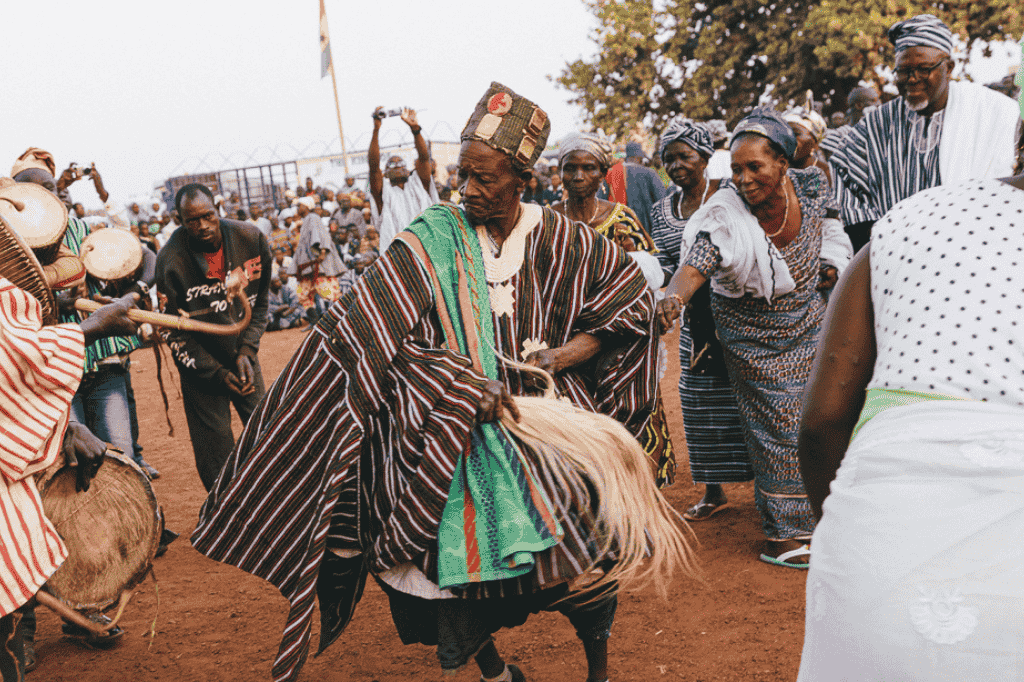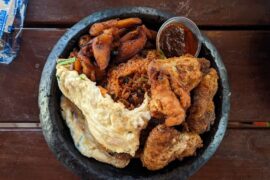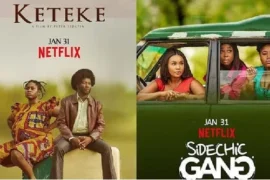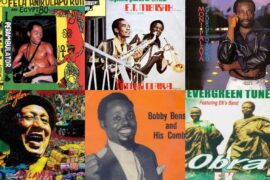Key Takeaways
- The Damba Festival originates from the Dagbon people in northern Ghana, celebrating harvests and honoring ancestors.
- It symbolizes unity and cultural identity, reinforcing social bonds among generations.
- Traditional drumming and dance performances convey ancestral stories and communal values during the festival.
- Modern celebrations blend tradition with community engagement, showcasing creativity and local delicacies.
- The festival serves as a vital link for passing down cultural heritage through intergenerational storytelling and hands-on participation.
Historical Roots of the Damba Festival
The Damba Festival, celebrated primarily among the Dagbon people of northern Ghana, has deep historical roots that intertwine cultural, spiritual, and agricultural significance. Its festival origins trace back to ancient traditions, where it served as a communal celebration of the harvest and an opportunity to express gratitude to the ancestors. You’ll find that historical influences, such as the arrival of Islam in the region, shaped many aspects of the festival, including its rituals and the timing of its observance. During this time, the Dagbon people honor the memory of their legendary kings and seek blessings for future prosperity. The festival also highlights the importance of unity, as families and communities come together, reflecting the collective identity forged through history. By immersing yourself in the Damba Festival, you’re not just witnessing a celebration; you’re connecting with a rich tapestry of cultural heritage and historical significance that continues to thrive today.Cultural Significance and Symbolism
While participating in the Damba Festival, you’ll notice that its cultural significance goes far beyond mere celebration; it embodies the values and beliefs of the Dagbon people. This vibrant event serves as a powerful expression of cultural identity, where generations unite to honor their heritage. The intricate rituals and communal gatherings highlight the importance of kinship and shared history, reinforcing social bonds within the community. The festival also fosters a spiritual connection, as participants engage in prayers and offerings to the ancestors and deities. This connection not only strengthens individual identities but also cements the collective spirit of the Dagbon. As you witness the colorful displays and hear the rhythmic drumming, you can feel the pulse of a culture that values respect, unity, and continuity. In this way, the Damba Festival becomes a living tapestry of tradition, weaving together past and present for future generations.Traditional Practices and Rituals
Amidst the vibrant celebrations of the Damba Festival, traditional practices and rituals take center stage, showcasing the rich cultural heritage of the Dagbon people. You’ll witness the powerful drumming traditions that resonate through the air, drawing everyone into a rhythmic heartbeat that connects the past to the present. Skilled drummers, often clad in traditional attire, create intricate patterns that set the tempo for the festivities. Dance performances are equally enchanting, with participants expressing stories of their ancestors and communal values through movement. Each step and gesture reflects not just joy but also a deep sense of identity and belonging. As you observe, you can feel the unity among the dancers, enhancing the festival’s spiritual essence. These practices serve as a living proof to the Dagbon people’s history, allowing you to appreciate the cultural significance that the Damba Festival embodies within the community.Modern Celebrations and Community Involvement
Modern celebrations of the Damba Festival reflect a dynamic blend of tradition and contemporary community engagement. You’ll notice how the festival activities have evolved, embracing both age-old customs and modern influences. Local communities actively participate in organizing events, showcasing their creativity through vibrant parades, music, and dance performances that resonate with both youth and elders. Food stalls featuring local delicacies foster social connections, encouraging neighbors to share meals and stories. Workshops and seminars during the festival highlight cultural education, making the experience enriching for everyone involved. As you stroll through the festival, you’ll see families and friends coming together, reinforcing bonds and creating lasting memories. This collaborative spirit not only celebrates heritage but also empowers the community to take ownership of the festival’s future. By blending traditional elements with modern flair, the Damba Festival continues to thrive, engaging the community in meaningful ways that honor its rich cultural significance.Passing Down Heritage: The Role of the Damba Festival in Future Generations
The Damba Festival serves as an essential conduit for passing down cultural heritage to future generations. Through vibrant celebrations and communal gatherings, you witness intergenerational storytelling come alive. Elders share tales of ancestors, imparting wisdom and traditions that shape your community’s identity. This exchange fosters a sense of belonging and continuity, ensuring that younger participants grasp the festival’s significance. Community engagement plays a significant role during these festivities. You’re not just a spectator; you actively participate, learning traditional dances, songs, and crafts. This hands-on involvement strengthens your connection to the past while fostering pride in your cultural roots. As you immerse yourself in the festival, you become a custodian of heritage, ready to pass it on. In this way, the Damba Festival not only celebrates your history but also equips you to carry it forward, ensuring its vibrancy for generations to come.Discover more from Ghana Scoop
Subscribe to get the latest posts sent to your email.





